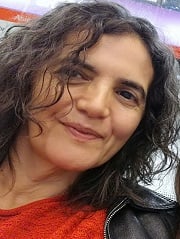Interview with Jacqueline Ponzo
 Dr Jacqueline Ponzo, president-elect of WONCA Iberoamericana- CIMF Region was recently interviewed in Barcelona while attending the semFYC (Spanish Society of Family Medicine) #BCNsemFYC Conference. This is a short version of the interview.
Dr Jacqueline Ponzo, president-elect of WONCA Iberoamericana- CIMF Region was recently interviewed in Barcelona while attending the semFYC (Spanish Society of Family Medicine) #BCNsemFYC Conference. This is a short version of the interview.
How are you planning your work as WONCA Iberoamericana-CIMF President?
I am currently in the period of pre-presidency and I am holding interviews with colleagues from different countries, finding out our organization members’ needs, trying to understand the current situation of each and every sub region. Indeed, visiting the Iberian Peninsula has allowed me to meet with semFYC and also with friends from the Portuguese society. Here, Family Medicine, leads the National Healthcare System, and the Iberian sub region has the particularity of being in between of Europe and Latin-America. Geographically, I think the Iberian Peninsula could become a very interesting meeting point between Latin-America, Europe and Africa, another WONCA Region with whom we have a lot in common, although until now, we have not shared a lot.
What is your biggest goal?
I would like that to increase our communication power and influence both at an academic and political way.
How?
First of all, you need to negotiate, to be flexible, and to make your position clear. In the academic domain, in order to be more present, it is necessary to have more scientific publications. And in the political domain, we have to work at looking at the societies scenario. The academic domain helps, but it is not enough. We also have to work with the regional health organizations, such as the Organización Panamericana de la Salud (OPS) or the Instituto Suramericano de Gobernanza en Salud (ISAGS). We also need to strengthen our relationship with WONCA World in order to make our dialogue with the World Health Organization stronger. It is important not be always inward looking, but to look outside. We must let the flower bloom, looking abroad and don’t be afraid: we are the first specialty of the health care system, we are at the first level of health, and the first level of health cannot work correctly without a Family Doctor.
Which are the different health care systems in Latin America?
In Latin-America we have a very exceptional case which is Cuba, a Universal Health Care system based on the Family and Community Medicine. Then we have the so-called unique systems, like the ones in Brazil and Uruguay, in which Family Medicine has been a very important support for the social progress. And, finally, we have the so-called fragmented systems like Argentina and Mexico, which are now evolving into more Family Medicine and Primary Care systems. In that sense, the new Argentinian Minister of Health is a Family Doctor.
How would you describe the WONCA CIMF role within WONCA World?
Our particular situation has to do with the kind of challenges we are facing, which are related to the social, geographical and historical context and, of course, our cultural background. WONCA is an Anglo-Saxon model of organization. This makes it strong in something but it is also very different from our culture. I believe that if we work closer with WONCA World this will help both, especially in community networks or associative work issues.
You will begin your WONCA CIMF presidential mandate at the WONCA World conference in Korea. How do you thing the Seoul Conference will be?
I think it will be an exotic conference - for us, Asia is an exotic place. We will be working a lot. We have already organized several activities dedicated to our Latin-American region and we hope that people will be interested in our area. It is stimulating to see how Asia is applying the Family and Community Medicine policies, specially taking into account that the new President of WONCA World will be from Hong Kong.
And the WHO 40th Alma Ata Anniversary taking place shortly after Korea?
I think the international political context is affecting us and it will be difficult to reach a global agreement such as the one we reached 40 years ago. I feel that everything which surrounds the Alma Ata movement is quieter than it should be, and I believe that this has to do with the realistic chances that compromise could be achieved at an international level, which at this point seems far away. What is for sure is that from WONCA Iberoamericana-CIMF’s perspective, we will be aware and we will try to take advantage of any agreement.
How can young doctors get involved with WONCA CIMF?
They can contact our Young Doctors Waynakay Movement (www.waynakay.org) and they can participate in many events and activities. We want them to be the be a core element of the new Iberoamericana-CIMF period.
Finally, what can you tell us about the conference you will be holding in Tijuana in 2019?
Like all the Latin-American conferences it will be a place for meeting and growing our organization. “Migration and Health” will be the main subject of the Conference, that is why we have chosen Tijuana, which is placed in the border between Mexico and the United States. We want to help with our speciality and our work to help societies to evolve and to get more united with their own cultural and social diversity.
Find out more about Jacqueline Ponzo